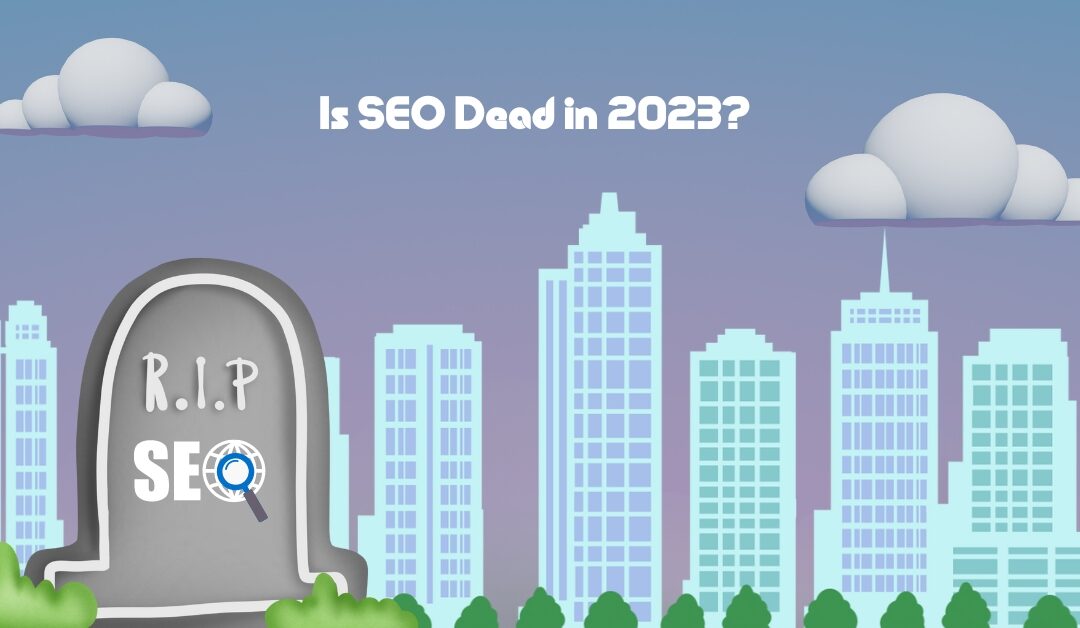Are you losing sleep at night?
Do you worry about robot 🤖 overlords taking over the internet? Are you stuck asking yourself, is SEO dead now?
It can be frightening if you invested a fortune in human-written content, only to find out that AI is here to do it cheaper and faster. But cheer up, buttercup!
Pull yourself out of the Swamp of Sadness because just like the horse in Neverending Story, SEO never really died and I’ll explain why below.
I’ve been in the industry for over 10 years now and just like Pepperidge Farm, I remember every time SEO died a horrible death from:
- Penguins
- Pandas
- Mobilegeddon
- YMYL
- And now it’s ChatGPT…🥱
Somehow, our industry managed to not just survive but thrive in a sea of constant change and we will continue to do so. SEO is still alive and kicking, unless you want to make the argument that we’re all living in the Matrix.
In that case, I guess Schrodinger’s SEO is simultaneously alive and dead? 🤔
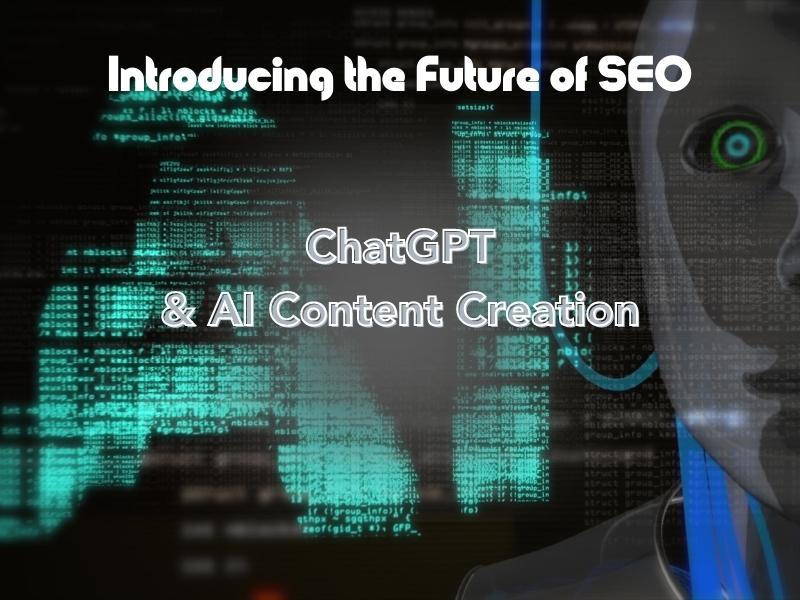
Is SEO Dead in 2023?
No, but traditional SEO is dead…With every new technology comes an opportunity for new SEO tactics, techniques, and strategies. Overall SEO isn’t dead but the old way of doing things are no longer valid.
So saddle-up up as we explore some key insights into new tactics and explore how SEO still fits perfectly into your overall digital marketing strategy!
Introducing the Future of SEO – Understanding ChatGPT and AI Content Creation
The future of SEO has indeed been thrown into a tailspin with the introduction of ChatGPT and AI writing technology. It remains to be seen when Google will update its ranking algorithms in light of this rapid shift, but what we do know is that ChatGPT and AI promise to revolutionize how organizations produce content.
Some will win and others will lose, depending on how they integrate AI into their workflows.
The Winners and Losers of the AI Content Arms Race
Many companies will jump in head-first and hardly bother to edit, correct, and personalize the machine-written content before publishing it. Those are the losers. Their strategy leads to a bad user experience and some of the most B-O-R-I-N-G garbage you’ll ever read. If that’s your plan for using AI to write content, expect Google to slap your site in the face and not think twice about getting invited back to the Oscars next year.
On the other hand, if you work with AI to make content that keeps people engaged on your website, you’ll be able to produce high-quality work in about half the time!
The winners in the AI arms race understand you can’t rank content no one wants to read and expect it to stay at the top of search results for more than a few weeks.
Want your content to go from boring shit to THE shit? Hire Webology!
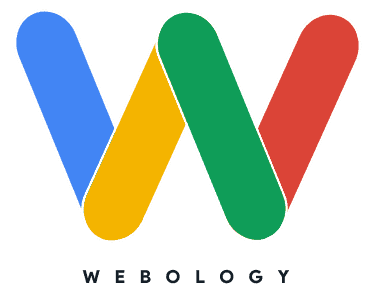
How to Prepare Your Business for a Rapidly-Evolving SEO Landscape
Start by acknowledging the fact that your competitors will leverage AI to produce content faster than they ever have before. Search engines will respond in kind by making small revisions to their algorithms which will focus less on publishing frequency and more on signals like authority and user behavior. So, in the short term, you can take advantage of the fact that algorithms have not adjusted to the new reality yet and crank out as much content as possible without sacrificing quality.
In the long term, you need to focus more on links and ‘E-EAT’ signals (Expertise, Experience, Authority, and Trust).
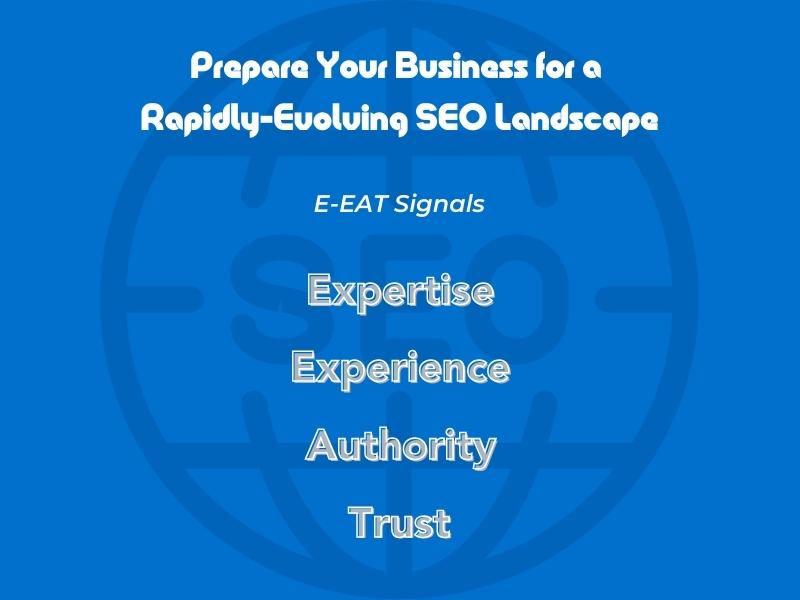
What Does This Mean for the Future of Search Engine Optimization?
With the introduction of ChatGPT and Artificial Intelligence (AI) technology, the search engine optimization landscape is being completely revolutionized. New SEO tools provide marketers with the opportunity to scale up content production like never before and the temptation to go after more traffic with the rapid production of low-quality articles is hard to resist.
Content is rapidly becoming a commodity, so you need to stand out by focusing more on the quality of what you provide your readers. Build thought leadership by demonstrating either professional expertise or real-words experience in the field. This helps you establish authority on a topic and earns the trust of readers and search engines alike. In the future, communicating who you are and why you’re an expert on your website will be at the top of any good SEO checklist, and publishing frequency will be slightly less important.

Links Will Matter a Lot More
We’re already seeing this trend, especially in the affiliate marketing space. Top results are dominated by general authority sites, while niche-specific publishers get pushed further down in the results with each broad core update. Topical authority is easier to achieve now, so search engines will give more weight to the tried-and-true link signals that are increasingly difficult to manipulate without hard work from your outreach team.
Creating page after page of content will have a big impact in the near-term, but I expect once everybody starts doing this links from a high authority domain will matter more than ever before.

Low Traffic Keywords Become More Competitive
Those 4-5 word question and answer style keywords we used to be able to rank for with less than 1,000-word articles will become the target of more sites looking to generate ad revenue.
I expect what’s required to rank informational content will become increasingly difficult in the next few years as news sites start producing massive round-up posts with very little need for human editing.
Tools like Jasper are already so good at producing a lot of information on basic topics that it’s hard to tell it apart from human-written copy.
As these tools continue to improve, it’s tempting to wonder just how much longer will people be involved in the creation of website content.
Will AI Replace SEO?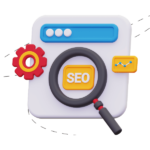
SEO is not dead, but the way we go about it will probably change forever. We will adjust our keyword strategies and adapt to a new search environment where a new chat widget might take away a percentage of the traffic that would otherwise click on the traditional blue links that lead to independent publisher websites.
We will adapt, just like we did when featured snippets heralded the imminent demise of organic search.
And I don’t see marketing teams downsizing on writing staff either. Writers who embrace these trends and take training courses to program desired outputs from tools like Jasper and Rytr will have an advantage in the SEO job market. Instead of replacing SEO with something else, I see a future where SEOs become more specialized and adapt to the ever-evolving search landscape.
Why do People Think SEO is Dead?
I think the main reason people think SEO is dead is that it’s changed so drastically over the years. When we talk about SEO today, it looks very different than what it used to look like even five or ten years ago.
With Google introducing new algorithms and technologies regularly, many people have difficulty keeping up with all of the changes. They assume that since things are constantly changing, SEO must be “dead” in its current form, and something new needs to replace it.
That Isn’t True!
SEO will always exist as long as there are search engines out there! It simply requires more attention to detail and an understanding of how search engine algorithms work to stay ahead of the competition.
As long as you put the effort in to think ahead a few years, you will never have to worry about SEO ‘dying’. 🙄
The First Time it was Declared ‘The End’ was 1997
In November of that year, Richard Hoy was credited by Search Engine Journal as being the very first to predict the untimely demise of SEO. Over the years, many others from Jeremy Schoemaker to Google’s own Matt Cutts pondered if it is dead or not.
With each passing year, things like voice search, major algorithm updates, and the addition of more ad space to the SERPS seemed to bring about near annual spikes in interest around the topic:
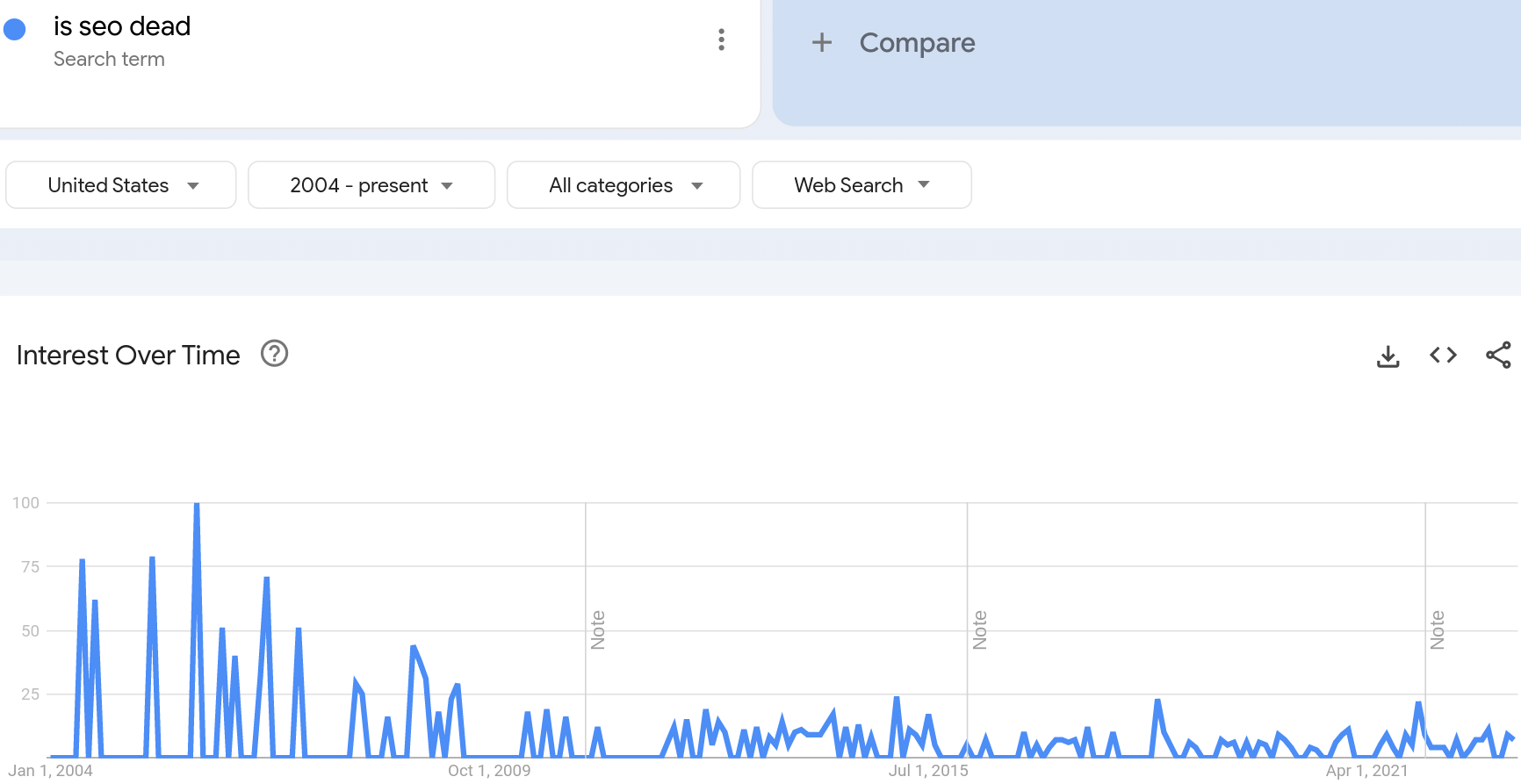
The truth is, SEO isn’t dead or dying. What has changed over the years is the strategies used to optimize web pages for search engine visibility. As technology and algorithms have grown more sophisticated, so have the techniques used to create websites that are attractive to both users and search engines. While it may not be as easy as it once was to rank a website in organic search results, SEO still exists and can be just as effective today, if not more so than ever before.
It’s clear that SEO is here to stay. It’s important for businesses of all sizes to realize that they must invest in proper optimization if they want their products and services to stand out from the crowd and remain competitive in today’s digital landscape.
Will SEO Still Exist in 5 Years?
While no one can accurately predict that far in the future, I do think our tools will get to the point where we focus almost solely on strategy. Much of what goes into an SEO plan today involves a lot of repetitive work, and I think removing that tedium from human hands is a good thing!
No one wants to rewrite the same content to fit 20 different local markets manually when they could be vacationing at the beach 🏖️
SEO strategy services will always require a thoughtful approach. I’m optimistic that tools will absolutely complement this process, while not completely replacing the humans behind the wheel. There will always be a need for experienced SEOs to assess the data and make informed decisions about what kind of content works best in any given situation.
As long as humans are involved in strategy and implementation, search engine optimization will exist for many years to come.

One Way it May ‘Die’
There is one scenario where the industry may take a serious hit and that is if Google and other search engines completely flip the switch on organic results. But then they run into the problem of not having any crawlable content to use as a model to train your AI on, so it’s impossible to completely replace Google search with a chatbot right now. And then there’s the massive server costs each day when thousands of queries per minute start flooding into an advanced human language algorithm…
Free Searches Are What’s Dead Actually
Right now, it’s costing about 6 cents per query for the free version of ChatGPT. In comparison, searches on Google cost less than a penny by some estimates, making for an interesting cost comparison. And it’s also the reason I suspect free use of ChatGPT is already dead ☠️ For any version of ChatGPT to exist for free in the future, it will require monetization with ads that demand a high CPM or lower server costs and that’s just not likely.
This is expensive technology, and I suspect many of us will gladly switch to a paid version soon enough.
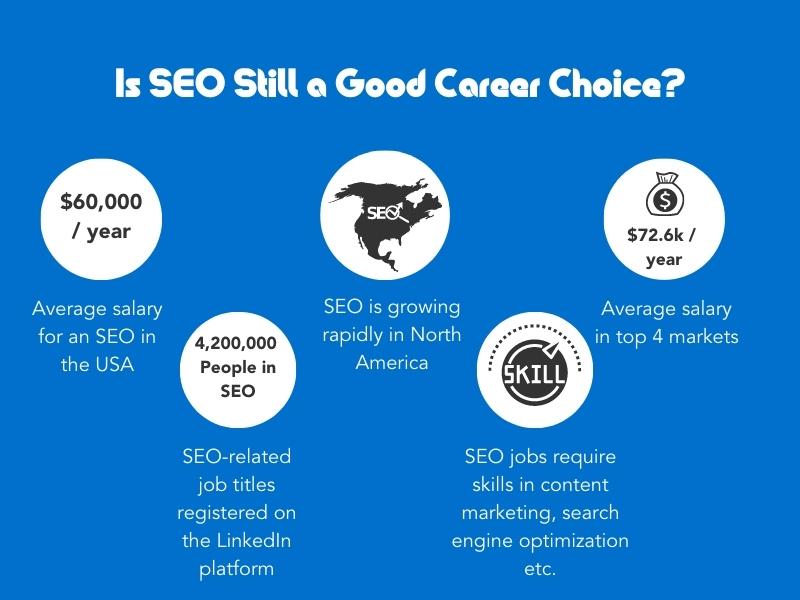
Is SEO Still a Good Career Choice?
Absolutely! SEO is still a great field to pursue because it’s ever-changing and highly competitive. With the right skills, you can stay ahead of the competition and be successful in this industry.
Plus, there are more opportunities than ever before to specialize in certain areas such as local SEO or content optimization. As long as you have an understanding of search engine algorithms and can stay up-to-date with the latest trends, SEO will remain a great career choice for years to come.
Here’s a few more facts about the SEO job market you might want to know:
- The average salary for an SEO in the USA is about $60,000+ per year.
- SEO is growing rapidly in North America, especially when compared to other jobs.
- The highest annual salaries on average ($72.6k/year) are paid by companies in CA, CT, NY, and NJ.
- According to LinkedIn, there are currently 4,200,000 people with SEO-related job titles registered on the platform.
- SEO jobs require skills in content marketing, search engine optimization, Google Analytics, Search Console, data analysis, and content creation.

What About Local SEO?
Is local SEO dead now that you can infinitely re-write landing pages to cover more cities and suburbs with your content?
No, local SEO isn’t deceased either. Put the Hearse back in park. ⚰️ If anything, there is a golden opportunity here for local brands to be first-to-market with an accelerated content production strategy in the coming months.
As marketers, we should all strive to ensure our content is relevant to the local market and how we can scale it up faster.
- Write unique content about your services for location A
- Use a tool like Jasper to rewrite it for you and change it to location B
- Add a little unique content about the local area on each page
That’s the simple 3-step process we use to create location page content at scale for our local SEO clients.
Local SEO can be used as a powerful tool to help your business reach its full potential when it comes to drawing in more customers. With the right SEO strategy tailored specifically for each local market, businesses can gain traction quickly and gain valuable insight into what their potential customers look for when shopping locally online.
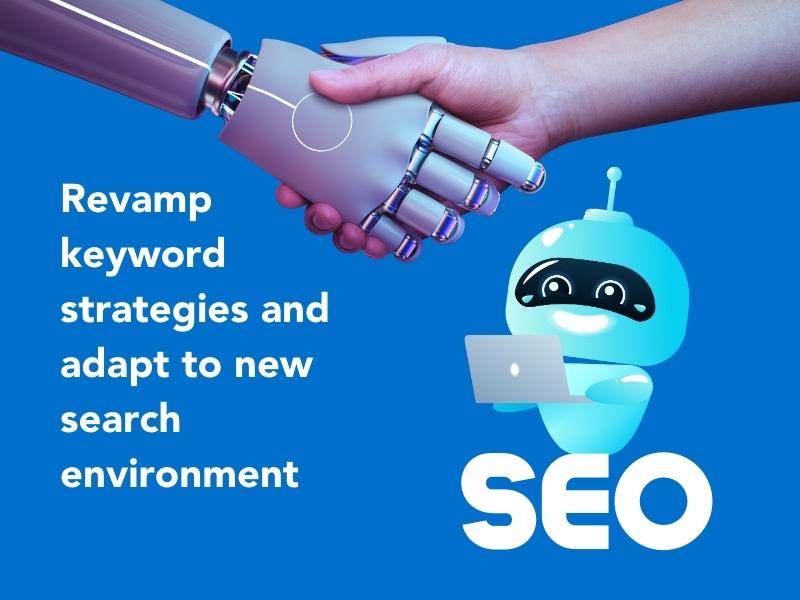
How is eCommerce Affected by AI Content Writing Tools?
This is an interesting question because many high-ranking eCommerce pages are thin on written content compared to other websites. I believe you will start to see written content more often on product category pages, and even on some individual product pages that traditionally just displayed a gallery of images and a brief description.
AI content writing tools have the potential to make this process much more efficient and effective. With AI, you can quickly generate SEO-optimized product descriptions that are also tailored for each unique product. This ensures that your pages stand out from the competition and boosts your eCommerce site’s rankings in search engine results.
Additionally, these AI-generated descriptions can be used in other areas such as email campaigns or even on social media platforms to draw in more customers. All of this adds up to a better overall user experience and a higher conversion rate for online businesses that take advantage of AI content writing tools.
In Conclusion
AI content writing tools are here to stay. They can save time, money, and effort for marketers who need to generate high-quality written content quickly and efficiently. From local SEO optimization to eCommerce product descriptions, these tools have the potential to revolutionize many aspects of online marketing for businesses of all sizes. As more companies realize the power of AI content writing tools, it only makes sense that we will continue to see them become even more popular in the years ahead.
It’s an exciting time to be in marketing and with AI on our side, anything is possible!
The implications of AI content writing tools do not herald the imminent demise of SEO as a tool in the marketer’s arsenal. Far from it! AI content writing tools can help you build a more comprehensive SEO strategy and enable you to create better, more targeted content in less time. In addition, they can also be used to supplement your existing written content so that you have more options when it comes to optimizing for search engines.
With all of these positives, there is no question that SEO is still an essential part of any successful online marketing strategy, and will remain so for the foreseeable future.
We can expect to see even more advancements in AI content-writing tools over the coming months and years.
How Webology Leads the way in SEO Research
If you’re looking for a good example of how an agency might use artificial intelligence to produce outstanding blog content that satisfies user search intent, look no further than this very post!
At Webology, we’ve been testing the use of automation in everything from keyword research to technical SEO. Change is in our DNA!
We’re the company you call for results driven SEO strategies backed by technical know-how and the best link building team in the South.

About the Author:
Blake Akers leads the team at Webology, which is an independently managed business division of Webology headquartered in Birmingham, Alabama. Blake has been learning and perfecting his craft in SEO, while also building a talented team of search engine experts for over 10 years.

Webology is THE SEO agency and a thought leader in the marketing industry that’s well-known throughout the Southeast.
You can stay up to date with the latest in SEO by following Blake on Social Media.
